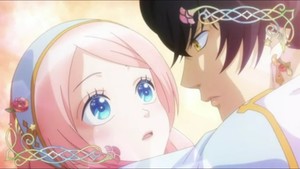Nina the Starry Bride
Episodes 1-2
by Rebecca Silverman,
How would you rate episode 1 of
Nina the Starry Bride ?
Community score: 3.8
How would you rate episode 2 of
Nina the Starry Bride ?
Community score: 3.6

This pseudo-Arabian Nights story may not have a Scheherazade, but it has a frame story. In case you're not familiar with it, the ancient Persian text known variably as The Arabian Nights, The Arabian Nights' Entertainment, and 1001 Nights is a massive collection of folklore, all held together with the conceit that Scheherazade is narrating the tales to her husband to prevent him from killing her. By titling the episodes as “nights,” Nina the Starry Bride is calling upon the memory of Scheherazade's tale – Nina, the heroine of the story, is plucked from the streets and forced to masquerade as Alisha, the dead princess of the nation. If she wants to survive, she'll have to play out Alisha's story, even if that means that “Nina” might as well be dead.
It's a solid concept, albeit one that at least thus far works better in its original manga; the anime feels like it's racing ahead, presumably to get to the point where Alisha is supposed to marry the prince of neighboring Galgada. These first two episodes do an okay job of introducing us to the main cast in Nina's home country, with the queen and little Prince Muhulum being the standouts, which I realize is sort of a sad statement when Azure and Nina/Alisha are clearly the main characters. However, the way that the queen treats them both does a fair bit to demonstrate their positions in the royal court. She's unrelentingly nasty to both of them, sneering like a two-bit villainess in a Victorian melodrama and pointedly putting them down at every opportunity. Even before we learn that Muhulum, despite being about six, is the first prince, it's an easy guess that she's not the king's first wife and her cruelties are intended to show Azure that she has the power, not him. (Why she'd have a problem with Alisha, who is going to be married off, is less clear.)
But the queen's actions don't consider what's actually best for her son. Muhulum is desperate for attention from his older siblings, immediately bonding with Alisha when they meet and spending his time hiding in shrubbery so that he can watch Azure go about his day. A piece of the little prince seems aware that he's an odd choice for the crown prince, and from a few of his comments, it seems like he'd much rather Azure took over the position. But more troubling is the overheard remark that Muhulum is sick in bed “again,” which implies that he's not a healthy child – and that Azure used to be sickly, too. At first, it looks like Azure grew out of it, but at the end of episode two, we learn that Azure is like Alisha: not the original prince. He made the shift younger, not even remembering his parents' faces or his original name, but that all implies that the real Azure died. Apart from making it look like the king has terrible luck with his offspring, it outlines a real threat to Muhulum, especially if he keeps tumbling down old wells.
This all works with the idea of death as both a threat and a promise. In the opening scenes of episode one, someone who seems to be Azure tells a bedraggled “Alisha” that she's going to die – the same thing that Azure tells Nina when he forcibly recruits her to masquerade as his dead sister. At the end of episode two, Nina breaks down because she doesn't want herself as “Nina” to die, which triggers Azure's realization that his childhood self already has. Death doesn't necessarily represent the end, but an ending, which makes way for a new start. Nina the Starry Bride's first two episodes play with that idea, using it like Scheherazade used her stories to tease one more night out of a terrible situation. Azure's assurance to Nina that he will call her by her real name when they're alone is the first truly hopeful statement she's heard since she was orphaned. The manga's beautiful art may not have made the transition to anime as smoothly as I hoped – there are some very odd walking and stiff facial expressions – and the pacing may feel too fast, but the heart of the story seems to be intact, ready to be spun out over its twelve nights.
Rating:
Nina the Starry Bride is currently streaming on Crunchyroll.
The views and opinions expressed in this article are solely those of the author(s) and do not necessarily represent the views of Anime News Network, its employees, owners, or sponsors.
discuss this in the forum (52 posts) |
back to Nina the Starry Bride
Episode Review homepage / archives